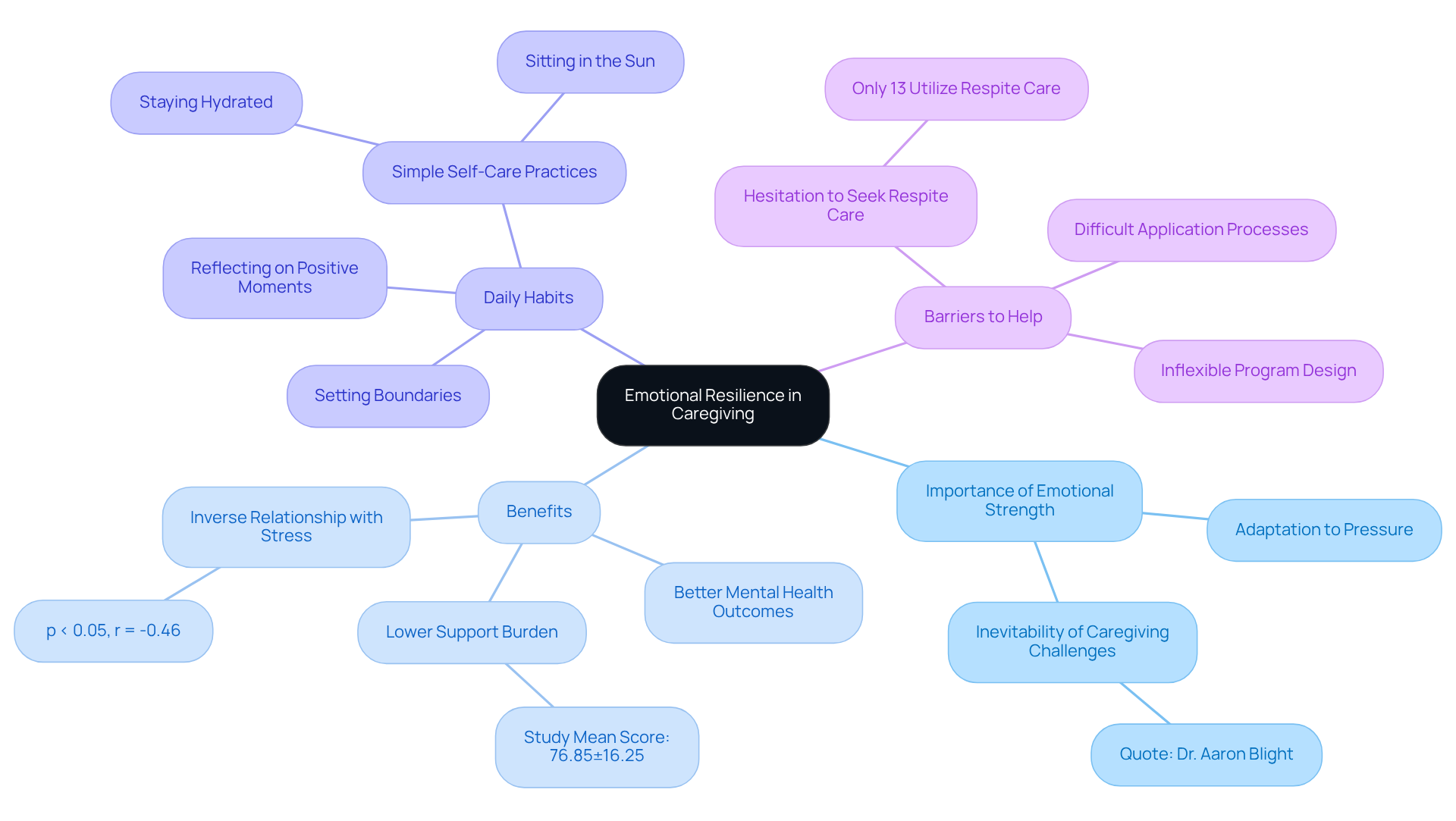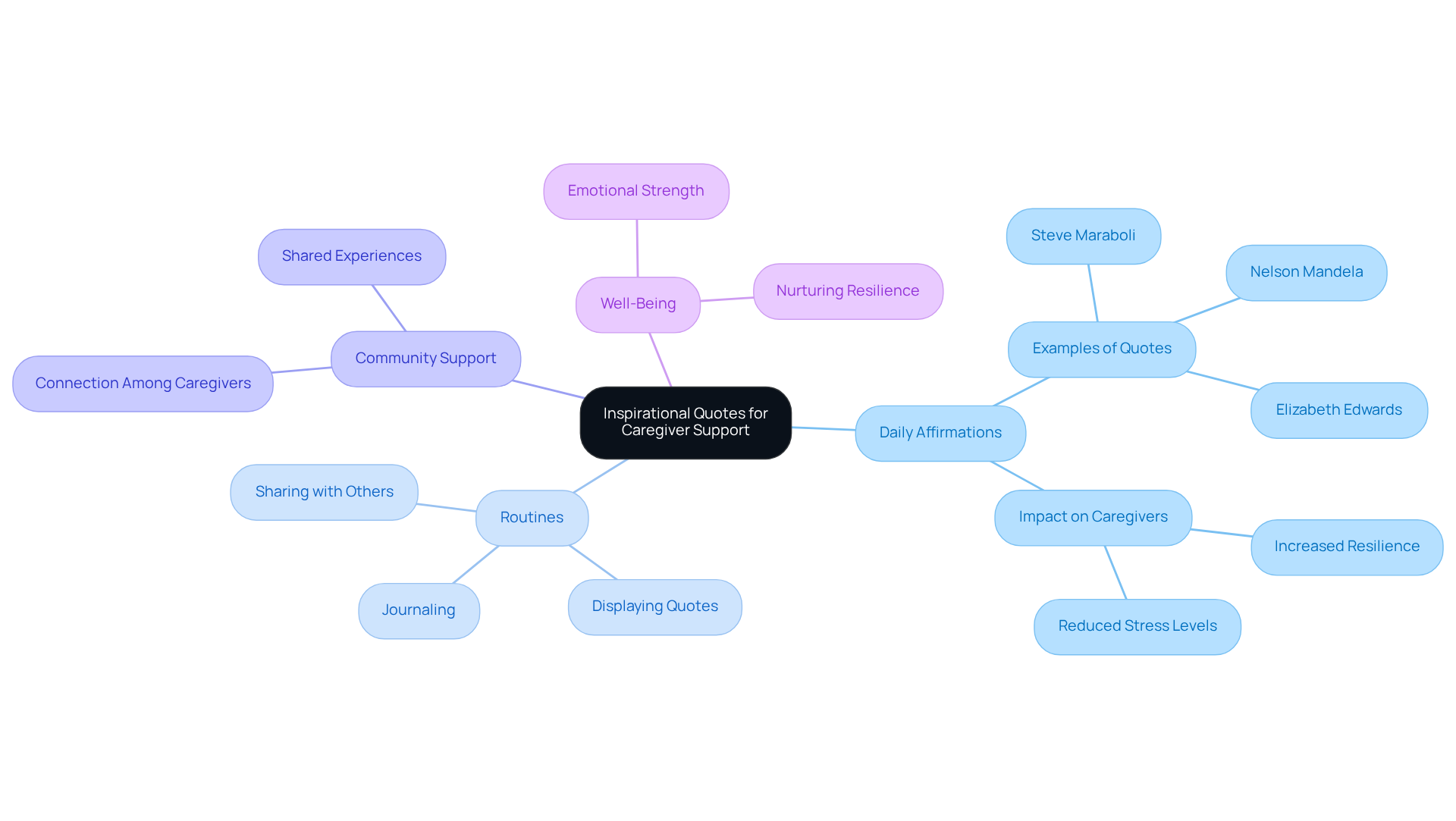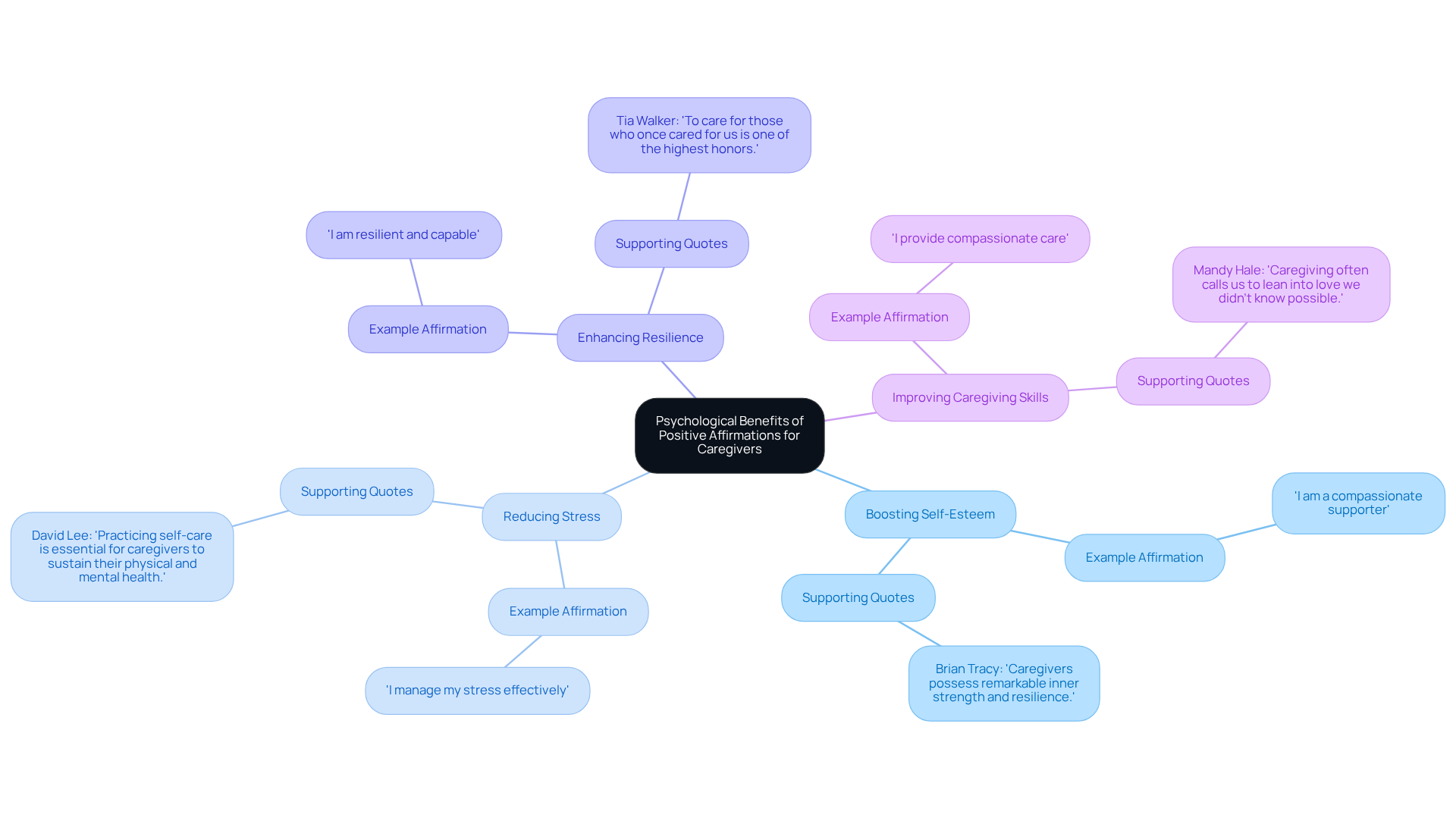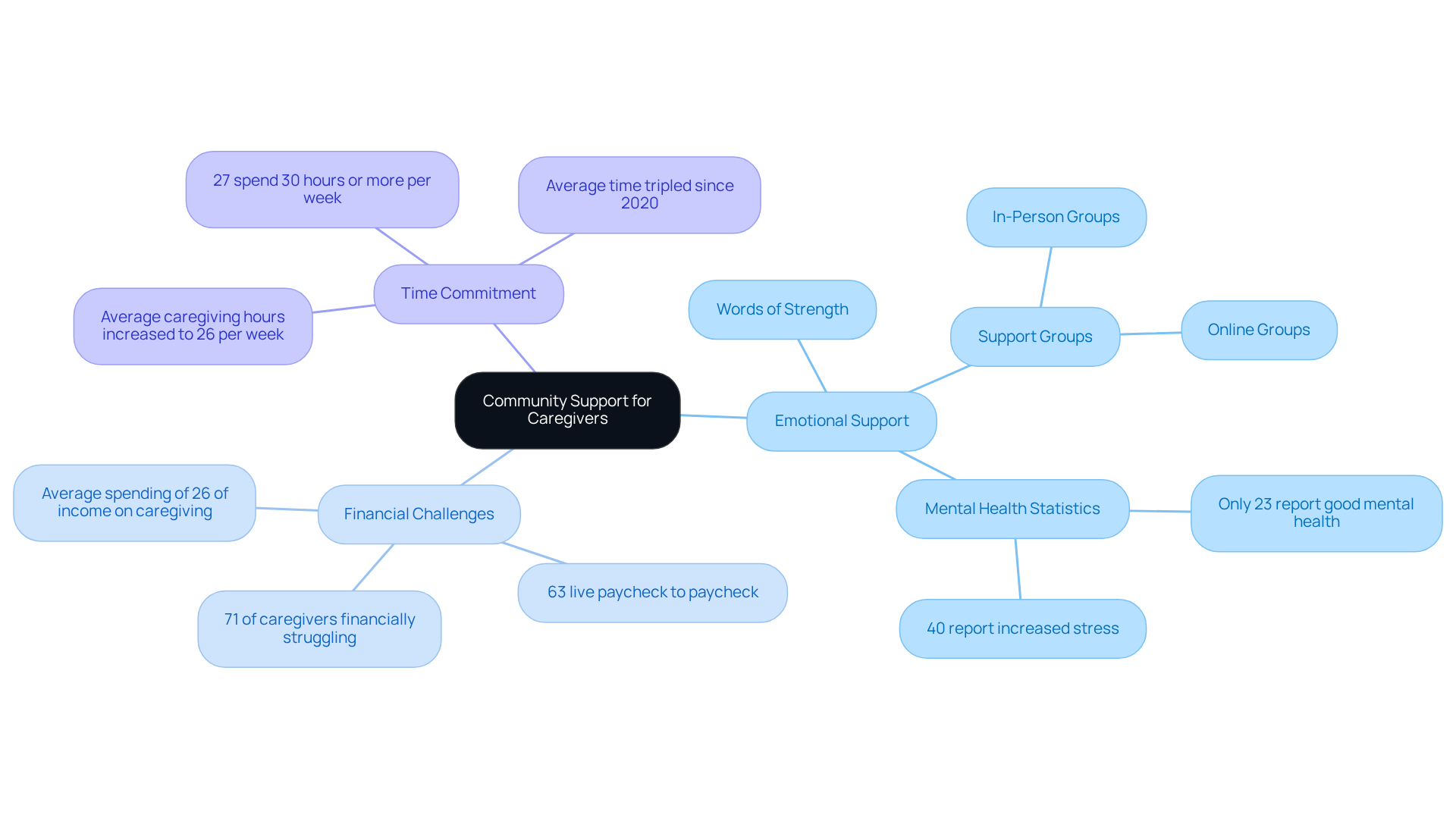Introduction
Emotional resilience is truly a cornerstone of effective caregiving. Yet, many caregivers find themselves weighed down by their responsibilities. It’s a heavy burden, and it’s completely understandable to feel overwhelmed. The power of words—especially those that inspire and uplift—can be a game-changer in this journey. By harnessing affirmations and motivational quotes, caregivers can not only bolster their mental strength but also combat stress and enhance their overall well-being.
But how can caregivers effectively weave these words of strength into their daily lives? It’s about fostering resilience and building a supportive community. Imagine transforming your caregiving experience by integrating uplifting messages into your routine. It’s not just about surviving; it’s about thriving together, sharing the load, and finding joy in the journey.
Establish the Importance of Emotional Resilience in Caregiving
Emotional strength is the ability to adapt to pressure and hardship, a vital trait for those who often juggle heavy responsibilities. As Dr. Aaron Blight wisely notes, “If caregiving hasn’t knocked on your door yet, it’s only a matter of time.” This highlights the reality that these challenges are inevitable. Without nurturing words of strength for a caregiver, the psychological strain of caregiving can result in burnout and compassion fatigue.
Research shows that caregivers with greater psychological strength enjoy better mental health outcomes and demonstrate higher effectiveness in their roles. For instance, a study involving family supporters of COVID-19 patients found that those with higher levels of fortitude reported significantly lower support burdens, with a mean score of 76.85±16.25. This underscores the inverse relationship between resilience and stress (p < 0.05, r = -0.46). Alarmingly, nearly two-thirds of caregivers report moderate to high psychological stress, emphasizing the need for emotional strength to ease these burdens.
By fostering mental strength and using words of strength for a caregiver, they can manage stress more effectively, maintain a positive outlook, and provide consistent support to their loved ones. This not only boosts their own well-being but also ensures they remain engaged and present in their caregiving roles, ultimately benefiting both themselves and those they care for.
Simple daily habits, like reflecting on positive moments and setting boundaries, can nurture resilience. It’s essential for caregivers to prioritize their emotional well-being, especially amidst challenging responsibilities. Additionally, understanding the barriers to accessing respite care services is crucial, as many caregivers may hesitate to seek help, even when they recognize its potential benefits.
Utilize Inspirational Quotes as Tools for Caregiver Support
Inspirational quotes act as words of strength for a caregiver, providing powerful daily affirmations that offer motivation and comfort during challenging times. For example, the sentiment, ‘Strength grows in the moments when you think you can’t go on but you keep going anyway,’ resonates deeply with those grappling with fatigue and uncertainty. This quote, attributed to Steve Maraboli, highlights the resilience essential in caregiving.
Incorporating these quotes into daily routines—whether through journaling, displaying them in caregiving spaces, or sharing them with fellow caregivers—can help nurture a resilient mindset. This practice not only reinforces their commitment to providing care but also fosters a sense of community, reminding caregivers that they are not alone in their journey.
The positive impact of such affirmations is clear; they serve as words of strength for a caregiver, promoting perseverance and emotional strength, qualities vital for sustaining their important roles. Case studies, like ‘Encouragement for Supporters,’ show that individuals who regularly engage with motivational quotes report improved well-being and reduced stress levels. This underscores the significance of uplifting words.
Moreover, as Albert Schweitzer wisely noted, ‘The purpose of human life is to serve and demonstrate compassion to others.’ This further highlights the importance of community support among caregivers, reinforcing the idea that together, they can navigate the challenges they face.
Examine the Psychological Benefits of Positive Affirmations for Caregivers
Positive statements act as words of strength for a caregiver, assisting them in facing and overcoming negative thoughts. Many caregivers experience stress and burnout, and research shows that using words of strength for a caregiver by regularly practicing positive affirmations can significantly boost self-esteem and reduce stress levels. For instance, saying ‘I am a compassionate supporter, and my efforts create an impact’ provides words of strength for a caregiver, helping them recognize their worth and contributions.
By consistently repeating these affirmations, caregivers can discover words of strength for a caregiver that help shift their mindset from self-doubt to empowerment. This transformation not only enhances their emotional resilience but also offers words of strength for a caregiver, improving their caregiving skills and enabling them to provide better support to their loved ones. Studies have shown that self-affirmations can lead to improved mood and increased compassion, highlighting the words of strength for a caregiver, which emphasize their remarkable inner strength and resilience.
As Tia Walker beautifully puts it, ‘To care for those who once cared for us is one of the highest honors.’ Navigating the complexities of caregiving can be challenging, but using words of strength for a caregiver in daily routines can foster a greater sense of well-being and fulfillment.
Moreover, an analysis of 129 studies suggests that the benefits of self-affirmations can last for days or even weeks, highlighting their enduring positive impact on the emotional health of caregivers. Embracing these words of strength for a caregiver can truly make a difference in their lives.
Foster Community Support Through Shared Words of Strength
Building a network of supporters can provide invaluable assistance and motivation for caregivers. Sharing words of strength for a caregiver and personal experiences fosters a sense of belonging and helps reduce feelings of isolation. Support groups, whether in-person or online, enable caregivers to share words of strength for a caregiver, including quotes, affirmations, and personal stories that resonate with their experiences. This communal sharing not only validates their feelings but also reinforces the idea that they are part of a larger community facing similar challenges.
By nurturing these relationships, caregivers can enhance their resilience, gain new perspectives, and feel empowered to continue their essential tasks. In 2025, nearly 71% of caregivers reported financial difficulties, with 63% living paycheck to paycheck. This highlights the urgent need for both psychological and practical support. Alarmingly, only 23% of caregivers reported having ‘good’ mental health, underscoring the mental health challenges they encounter.
Support groups offer emotional assistance and companionship, which are vital in alleviating feelings of isolation. The average time caregivers spend providing support has increased significantly, from nine hours each week in 2020 to 26 hours per week in 2023. This rise illustrates the growing demands placed on those who care for others. Within these groups, discussions often revolve around stress-management techniques and problem-solving strategies, further enhancing the support available.
By fostering these connections, caregivers can better navigate the complexities of their responsibilities, ultimately improving their well-being and the quality of care they provide. Remember, you are not alone in this journey; there are people who understand and are ready to support you.
Conclusion
Emotional resilience is crucial for caregivers. It helps them navigate the inevitable pressures and challenges that come with their responsibilities. Words of strength can profoundly impact caregivers’ well-being, highlighting the need to nurture their mental health to prevent burnout and compassion fatigue. By embracing positive affirmations and inspirational quotes, caregivers can cultivate a resilient mindset. This not only boosts their emotional strength but also enhances the quality of care they provide.
Caregivers who actively engage with uplifting words often experience lower stress levels and greater psychological well-being. Research shows a strong link between resilience and effective caregiving, emphasizing the importance of daily habits that promote emotional health. Additionally, community support plays a vital role; sharing experiences and affirmations within support groups fosters a sense of belonging. This reduces feelings of isolation and reinforces the idea that caregivers are not alone in their journey.
Ultimately, prioritizing emotional resilience through positive language and community engagement is essential for caregivers. By adopting these strategies, they can significantly enhance their well-being, ensuring they remain capable of providing the compassionate support their loved ones need. Embracing words of strength is not just a self-care tactic; it’s a vital part of sustaining the emotional and psychological health of those who dedicate their lives to caring for others.
Frequently Asked Questions
What is emotional resilience in caregiving?
Emotional resilience is the ability to adapt to pressure and hardship, which is crucial for caregivers who manage heavy responsibilities.
Why is emotional resilience important for caregivers?
Emotional resilience is important because it helps caregivers manage stress, avoid burnout and compassion fatigue, and maintain better mental health outcomes.
What does research indicate about caregivers with higher psychological strength?
Research shows that caregivers with greater psychological strength report better mental health outcomes and lower support burdens, indicating an inverse relationship between resilience and stress.
What percentage of caregivers report experiencing psychological stress?
Nearly two-thirds of caregivers report moderate to high psychological stress.
How can caregivers nurture their emotional resilience?
Caregivers can nurture their emotional resilience through simple daily habits such as reflecting on positive moments and setting boundaries.
What role does emotional well-being play in caregiving?
Prioritizing emotional well-being allows caregivers to manage stress more effectively, maintain a positive outlook, and provide consistent support to their loved ones.
Why might caregivers hesitate to seek respite care services?
Many caregivers may hesitate to seek respite care services due to various barriers, even when they recognize the potential benefits of such help.





